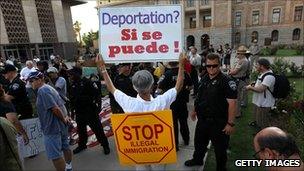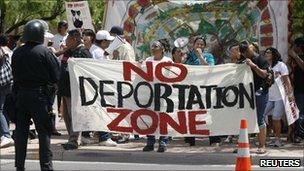Row over US-born immigrant children heats up
- Published

Arizona's controversial law has pushed immigration issues to centre-stage
A new battle line is being drawn in America's immigration debate: whether to repeal the 14th amendment to the US Constitution, which grants citizenship to anyone born in America.
But this time Republicans, who are usually vigorous defenders of the document's sanctity, are the ones arguing for change.
The 14th amendment to the US Constitution states, among other things, that all persons born in the United States are considered citizens and are subject to all the privileges and responsibilities such citizenship entails.
The amendment was adopted in the wake of the civil war, as a political debate raged over whether slaves imported from Africa, and their children, could be considered US citizens.
More than 150 years later, politicians are debating the amendment again. This time, they're wondering whether children born in the US to undocumented immigrants should be considered citizens simply by virtue of their birth.
Although it started as murmurs on the conservative fringes of the Republican party, the debate is poised to roar in DC.
Anchor babies
Senators John McCain, Jon Kyl and Lindsey Graham have called for Congress to examine the amendment.
Interestingly, Sen McCain and Sen Graham had previously championed immigration reform legislation that included a path to citizenship for illegal immigrants - earning Sen Graham the nickname Lindsey Grahamnesty.
Senator Jeff Sessions, the leading Republican on the Judiciary Committee, supports the idea of holding hearings to discuss the amendment, but the notion has been dismissed by the Democratic committee chair Patrick Leahy.
The crux of the issue are mothers of so-called anchor babies - women who are said to come to the US specifically to have children, some of them who enter the country illegally, others as tourists.
Sen Graham told the Fox News Channel that the problem was "thousands of people are coming across the Arizona/Texas border for the express purpose of having a child in an American hospital so that child will become an American citizen, and they broke the law to get there."
"We ought to have a logical discussion. Is this the way to award American citizenship, sell it to somebody who's rich, reward somebody who breaks the law? I think we need to look at it really closely," Sen Graham told Fox.
It's highly unlikely that the senators will be successful in altering the 14th amendment.
Changes to the US constitution must be passed by a two-thirds vote of each chamber of Congress and then ratified by three-quarters of states - either by the state legislatures or state-based constitutional conventions.
So far, support for the repealing the amendment is confined to a small group of conservatives. Even Lou Dobbs, a former CNN host famous for his stringent views on immigration, opposes a repeal.
"The idea that anchor babies somehow require changing the 14th Amendment, I part ways with the Senators on that because I believe the 14th Amendment, particularly in its due process and equal protection clauses, is so important," Mr Dobbs has said.
No deportation protection

Emotions are running high on both sides of the immigration debate
The Pew Hispanic Center estimates there are about four million American-born children of illegal immigrants under the age of 18 currently in the US.
Pew estimates that last year 7-8% of births in America (or around 350,000) were to undocumented mothers.
Marshall Fitz, director of immigration policy at the left-leaning Center for American Progress, suggests that the 14th amendment debate is purely political, aimed at ginning up conservatives ahead of November's mid-term elections.
He says that worries over "anchor babies" are misplaced, an intentional obfuscation of reality.
"The notion that there are legions of heavily pregnant women waddling across the border having babies is somewhat laughable," Mr Fitz told the BBC.
Moreover, having a child in the US is no guarantee that a parent will be able to stay.
American-born children cannot petition for green cards for their parents until they have turned 21. Then, if the parent is found to be in the country illegally, they must leave the country and are banned from re-entering legally for 10 years.
That means, presuming the parent has stayed in the country to raise their child, an illegal immigrant must wait 31 years to reap the rewards of their child's US passport.
Jeff Passel, senior demographer at the Pew Hispanic Center, told the BBC that having an American-born child is no protection from deportation.
Although in the past US-born children may have factored into a deportation decision, Mr Passel says that practice was abandoned under the Bush administration. Now, deported parents either take the child with them or leave the child with legal relatives.
Implementation challenge
Mr Fitz says that because most of the illegal immigrant mothers who give birth in the US are already living and working in America, repealing the amendment would have little impact.
It would however, be a "Herculean implementation challenge", he says, creating a new layer of bureaucracy in determining bloodlines.
"If we want to deal with problem of undocumented immigration, we should do so directly," Mr Fitz argues.
"There's a deep hypocrisy here. One of the ironies is that the people who have been championing the constitution, protecting second amendment rights, draping themselves in the constitution, are these same people who want repeal."
Still Republicans believe that they are the ones with their finger on the pulse of the nation.
On Monday, Senate Majority Leader Mitch McConnell railed against the "unseemly business" of "birth tourism" - where women pay thousands of dollars to have their children in fancy US hotels or resorts.
"I don't think anybody thinks that's something they're comfortable with," he told a reporter from The Hill newspaper.
Senator Jeff Sessions told reporters "I'm not sure exactly what the drafters of the (14th) amendment had in mind, but I doubt it was that somebody could fly in from Brazil and have a child and fly back home with that child, and that child is forever an American citizen."
"The Constitution is not as clear as it first appears," Sen Sessions said. "I continue to hear good Americans explain to me they think it makes no sense."
- Published4 August 2010
- Published30 July 2010